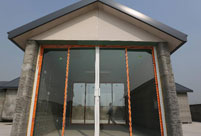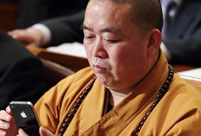 Let's dance in harmonic Shaanxi
Let's dance in harmonic Shaanxi
 Christie's to auction dazzling diamonds
Christie's to auction dazzling diamonds
 'Model husband' shatters image of love
'Model husband' shatters image of love
 Can animals smile? Or put on a happy face
Can animals smile? Or put on a happy face
 Geng Xuan crowned at 9th China Super Model Contest
Geng Xuan crowned at 9th China Super Model Contest
 Backstage at China Fashion Week
Backstage at China Fashion Week
 Ballerinas anywhere but onstage
Ballerinas anywhere but onstage
 Top 10 safest airlines in the world
Top 10 safest airlines in the world
 Posters of 33rd HK Film Awards unveiled
Posters of 33rd HK Film Awards unveiled
 Top 10 most popular instant messaging apps in the world
Top 10 most popular instant messaging apps in the world
LANZHOU, April 14 -- Safe tap water was once again running for 2.4 million residents in a Chinese city on Monday, after tests showed benzene levels in the water met national standards after a pollution incident.
Samples collected every two hours from 7 a.m. on Sunday to 5 a.m. on Monday indicated benzene levels were between 8.47 and zero micrograms per liter of water in Xigu district of Lanzhou City. China's national limit for benzene in tap water is 10 micrograms per liter.
Safe tap water was running in three other affected districts of Lanzhou, capital of northwest China's Gansu Province, on Saturday and Sunday, after tests showed safe levels of the chemical.
Excessive levels of benzene, which were more than ten times higher than national standards, were reported on Friday morning and the city government warned citizens not to drink tap water for 24 hours.
Investigators later found crude oil in soil along a duct between two water plants owned by Veolia Water, a joint Sino-French venture and the sole water supplier for urban Lanzhou.
The spill was initially believed to have leaked from a pipeline owned by Lanzhou Petrochemical, a subsidiary of China National Petroleum Corporation, the country's largest oil company, according to investigators.
Locals still have doubts about the cause of the pollution and are concerned about tap water safety.
In March, residents in Lanzhou complained to authorities about smelly tap water.
"We immediately carried out tests regarding all drinking quality indices. We found relatively high levels of ammonia and nitrogen but they were under the national limits," said Tian Hong, director of the water quality monitoring center of Lanzhou Tap Water Company.
The benzene in the tap water was initially judged to have come from pollutants soaking into the underground following previous leakages of Lanzhou Petrochemical, said Wang Jinsheng, a water science professor of Beijing Normal University and one of the investigators for the incident.
According to Zheng Zhiqiang, deputy head of the investigation team, the underground poisoned water from the water source will be further tested to confirm the connection between the oil leak and the contaminated tap water.
The team will investigate various departments and people responsible for the pollution, said Zheng.
The polluted underground ditch had been used for nearly 60 years. In the 1980s, an oil leakage occurred to the chemical pipeline under it, and was used after repairs until now, said Yao Xin, board chairman of Veolia Water.
The construction of an erosion-resistant, iron and steel duct for Veolia Water began on Monday to replace the polluted one and will be completed in ten days, said Feng Legui, an official with an emergency response team for the incident. The construction of a second duct will start soon.
The overuse of underground oil pollutant pipelines in Lanzhou cannot be ignored, said a source, who worked for Lanzhou Petrochemical for 12 years.
Built in the 1950s with a designed lifetime of 50 years, a 50-km-long major pipeline for petrochemical pollutants which traverses the city has been overused for nearly ten years, the source told Xinhua on condition of anonymity.
"Problems will arise sooner or later if petrochemical and tap water pipelines are located close to each other," he said.
The risks of aging oil pipelines near residential areas were highlighted after a pipeline explosion claimed 62 lives in the eastern Chinese city of Qingdao last year. Its major cause was corrosion that wore down the pipeline, which was operated by Sinopec, China's second-biggest oil producer.
Lanzhou Petrochemical can process 10.5 million tonnes of crude oil and produce 700,000 tonnes of ethylene a year. The company is in the upper stretch of the Yangtze River in Lanzhou and is close to the waterway, which is the only water source for the city.
Chemical plants and water sources should not be in the same area, said Wang Jinsheng. In the long run, authorities should search for a second water source area for Lanzhou, he added.
Yu Haiyan, Communist Party chief of Lanzhou, said petrochemical industry areas posed risks for the city's water supply and authorities should try to find a new source area.
A risk assessment for the petrochemical sector, conducted by the Ministry of Environmental Protection Ministry (MEP) in 2007, listed Lanzhou Petrochemical as highly risky for the environment and a potential threat to drinking water in a number of areas, including Lanzhou and other downstream cities.
More than ten cases of strange smells in tap water have been reported in cities like Jinan, Shanghai and Hangzhou since last year. In some cases, authorities insisted water met national standards.
In Hangzhou, citizens in several districts reported a strange smell in their tap water at the end of last year, but authorities insisted the water was safe until they found that the smell came from a type of chemical from factories.
China adopted a set of compulsory drinking water criteria in July 2012 and the number of indicators increased to 106 from the previous 35.
The country has 250 million residents living close to major polluters or alongside main traffic corridors, and people using unsafe drinking water reaches 280 million, said a report issued by the MEP in March.
China suffers about 1,700 water pollution incidents annually, with 140 million people in cities exposed to unsafe drinking water, government data showed.
Fu Tao, a professor with Tsinghua University on water industry management and policy, said the figures were "alarming".
"The quality of drinking water sources has seriously deteriorated by various industrial waste and agricultural chemicals," he said.
The fall in water quality at sources, lack of improvement in water treatment and aging pipelines, means that even tap water from plants meets quality standards, it may not be safe when it reaches people's homes, he said.
 3D-printed houses built in Shanghai
3D-printed houses built in Shanghai World largest scale of umbrella dance
World largest scale of umbrella dance Cherry blossoms reach peak bloom in Washington D.C.
Cherry blossoms reach peak bloom in Washington D.C. Red terraced fields in Dongchuan of Yunnan
Red terraced fields in Dongchuan of Yunnan Presentation ceremony of 33rd Hong Kong Film Awards
Presentation ceremony of 33rd Hong Kong Film Awards Cyber life of monks and nuns
Cyber life of monks and nuns Let's dance in harmonic Shaanxi
Let's dance in harmonic Shaanxi Jiaju Tibetan Village
Jiaju Tibetan Village Confucius institute at UC Davis
Confucius institute at UC Davis The backstage of the Fashion Week
The backstage of the Fashion Week College students in Han costumes
College students in Han costumes Postgraduate works as waitress
Postgraduate works as waitress Life in a Lahu village in Yunnan
Life in a Lahu village in Yunnan An orphan’s wedding
An orphan’s wedding Hollywood documentary brings Diaoyu Islands truth to new audience
Hollywood documentary brings Diaoyu Islands truth to new audienceDay|Week|Month